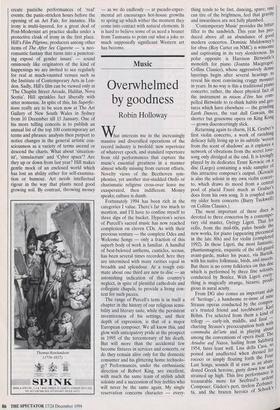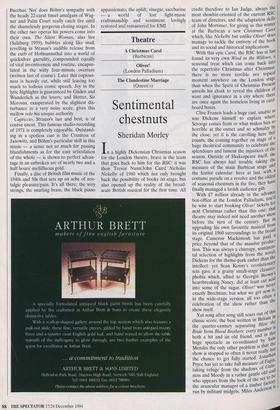Mu sic
Overwhelmed by goodness
Robin Holloway
hat interests me in the increasingly massive and diversified operations of the record industry is twofold: new repertoire of whatever epoch, and standard repertoire from old performances that capture the music's essential greatness in a manner almost wholly missing from current efforts. Novelty views of the Beethoven sym- phonies, yet another star-studded Otello or charismatic religiose cross-over leave me exasperated, then indifferent. Money speaks; culture is dumb.
Fortunately 1994 has been rich in the categories I value. There's far too much to mention, and I'll have to confine myself to three dips of the bucket. Hyperion's series of Purcell's sacred music has now reached completion on eleven CDs. As with their previous venture — the complete Odes and Welcome Songs — only a fraction of this superb body of work is familiar. A handful of best-beloved anthems, canticles, scenas, has been several times recorded; here they are intermixed with many rarities equal in breadth and splendour. At a rough esti- mate about one third are new to disc — an astonishing indication of this country's neglect, in spite of plentiful cathedrals and collegiate chapels, to provide a living con- text for such pieces.
The range of Purcell's texts is in itself a chapter in the history of our religious sensi- bility and literary taste, while the persistent inventiveness of his settings, and their depth of expression, is that of a major European composer. We all know this, and glow with anticipatory pride at the prospect in 1995 of the tercentenary of his death. But will more than the accidental few become fixtures in services and concerts, or do they remain alive only for the domestic consumer and his glittering home technolo- gy? Performances, under the enthusiastic direction of Robert King, are excellent, with much the same team of stylish adult soloists and a succession of boy trebles who will never be the same again. My single reservation concerns character — every- thing tends to be fast, dancing, spare; one can tire of the brightness, feel that gravity and inwardness are not fully plumbed. `Contemporary Music' provides the bitter filler to the sandwich. This year has pro- duced above all an abundance of good modern concertos. Dominic Muldowney's for oboe (Roy Carter on NMC) is winsome and captivating in its very slenderness. Its polar opposite is Harrison Birtwistle's monolith for piano (Joanna Macgregor; Collins Classics), whose aggressively dense layerings begin after several hearings to reveal his most convincing craggy monster in years. In no way is this a traditional piano concerto; rather, the sheer physical fact of the instrument as raison d'être has com- pelled Birtwistle to re-think habits and ges- tures which have elsewhere — the grinding Earth Dances, the vast dull Gawain, the shorter but gruesome opera on King Kong — grown disconcertingly slick. Returning again to charm, H.K. Gruber's first violin concerto, a work of ravishing delicacy fully living up to its subtitle 'woven from the scent of shadows' as it explores a network of vibrations from the secret love- song only divulged at the end. It is lovingly played by its dedicatee Ernst Kovacic on a disc (Largo) containing a wide sampler of this attractive composer's output. (Kovacic is also the soloist in my own violin concer- to, which draws its mood from a central pool of placid Faure much as Gruber 's does from his own song. It is coupled with my older horn concerto (Barry Tuckwell) on Collins Classics.) The most important of these discs is devoted to three concertos by a contempo- rary old master, GyOrgy Ligeti. That for cello, from the mid-60s, pales beside the new works, for piano (appearing piecemeal in the late 80s) and for violin (complete 1992). In these Ligeti, the most fantastic, phantasmagoric, exquisite of the old-guard avant-garde, makes his peace, via Bart& with his native folkmusic, birds, and insects. Butthere is no corny folklorica on this disc which is performed by three fine soloists, conducted by Boulez. With Ligeti every- thing is magically strange, bizarre, prodi- gious in aural acuity. From DG also comes an important slab of 'heritage', a handsome re-issue of nine Strauss operas conducted by the compos: er's trusted friend and torchbearer Karl Bohm. I've selected from them a kind of trilogy — early-ish, middle, and final charting Strauss's preoccupation both With commedia del'arte and in playing about among the conventions of opera itself. The Ariadne auf Naxos, hailing from Salzburg 1954, fares least well. Lisa della Casa, so poised and unaffected when dressed for rococo or simply floating forth the Four _ Last Songs, sounds ill at ease as an aban- doned Greek heroine, gusty down low and strained up high. This live performance is t treasurable more for Seefried's Composer, Giiden's pert, tireless Zerbin.,_ci ta, and the brazen heroics of Schocit Bacchus. Nor does B6hm's sympathy with the heady 22-carat tinsel amalgam of Wag- ner and Palm Court really catch fire until the shamelessly gorgeous closing stages. In the other two operas his powers come into their own. The Silent Woman, also live (Salzburg 1959), bubbles along like mad, revelling in Strauss's audible release from the curb of Hofmannsthal into a world of quicksilver garrulity, compounded equally of vital inventiveness and routine, encapsu- lated in the witty four-minute overture (written last of course). Later this copious- ness is heavily cut, while still leaving too much to tedious comic speech. Joy in the lyric highlights is guaranteed by Giiden and Wunderlich as the lovers; and Hotter, Sir Morosus, exasperated by the slightest dis- turbance in a very noisy score, gives this mellow role his unique authority.
Capriccio, Strauss's last and best, is of course uncut. This famous studio-recording of 1971 is completely enjoyable. Outstand- ing in a spotless cast is the Countess of Janowitz, and Bohm's particular skill in this music — a sense not so much for passing blandishments as for the easy articulation of the whole — is shown to perfect advan- tage in an unbroken arc of nearly two and a half hours' mellifluous gold.
Finally, a disc of British film music of the 1940s and 50s that sets up an ache of nos- talgic pleasure/pain. It's all there; the wiry strings, the snarling brass, the black piano appassionato, the uplift, vinegar, saccharine — a world of lost light-music craftsmanship and sentiment, lovingly restored and remastered for EMI.











































































































 Previous page
Previous page